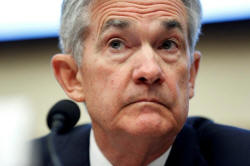Fed's Powell sends world stocks reeling to end turbulent
February
 Send a link to a friend
Send a link to a friend
 [February 28, 2018]
By Sujata Rao [February 28, 2018]
By Sujata Rao
LONDON (Reuters) - World stocks were set to
snap a record 15-month long winning streak on Wednesday, tumbling
another quarter percent after new Fed boss Jerome Powell's comments
suggested the possibility of four U.S. interest rate rises this year
rather than three.
Barely recovered from an early-February sell-off, equity sentiment has
been shaken by Powell and by data showing China's manufacturing sector
slowing to its weakest in over 1-1/2 years and Japanese industrial
output down the most since March 2011.
Equity futures signaled Wall Street would open flat after declines of
more than 1 percent on Tuesday when the U.S. Federal Reserve chief
delivered his debut testimony to Congress.
Powell had struck a mildly hawkish note, noting inflation had risen
since December and vowing to prevent the economy from overheating..
But that was enough for traders to add bets on the Fed squeezing in
another rate rise this year, with futures now pricing a one-in-three
chance of a fourth hike.

U.S. 10-year yields retreated after rising on Tuesday toward four-year
highs though the dollar hovered near three week peaks and is set for a
monthly rise against a basket of currencies after three months of
declines.
On equities, MSCI's all-country index fell 0.3 percent, capping a
turbulent month that saw trillions of dollars wiped off share markets
during an early-February volatility explosion.
"After yesterday, the market is contemplating that we will probably get
four rate hikes this year and you have seen the reaction in equities and
Treasuries," said Peter Garnry, head of global equities at Saxo Bank in
Stockholm.
Powell also said financial conditions remained accommodative despite
higher volatility. Wall Street's main volatility gauge, the VIX, closed
Tuesday with its biggest daily rise since early-February, easing only
slightly on Wednesday.
"The Fed 'put' for equities is likely still there but it's weaker,"
Garnry said, referring to investors' assumption that the central bank
would intervene to prop up equity markets.
"The recent vol hiccup has changed the volatility outlook to a higher
level."

European shares lost 0.5 percent, down 3.8 percent in February, their
first monthly loss since November.
Emerging equities fell 1 percent, pulled down by a 1.4 percent tumble in
Hong Kong and set for their biggest monthly loss since November 2016,
while Japan's Nikkei lost 1.4 percent and snapped a five-month run of
gains.
[to top of second column] |

Federal Reserve Chairman Jerome Powell delivers the semi-annual
Monetary Policy Report to the House Financial Services Committee
hearing in Washington, U.S., February 27, 2018. REUTERS/Joshua
Roberts

A fall in new orders for U.S.-made capital goods for the second month in a row,
plus the dismal Chinese and Japanese numbers, are also making investors fret
about a possible setback to growth, especially in China, the world's No. 2
economy.
Not everyone is bearish however.
"Equities and risk assets may wobble as yields rise, but stronger growth should
be good for corporate earnings and offset the impact from the expected increase
in central bank policy rates," the world's biggest asset manager BlackRock said.
Unicredit analysts agreed. They said that while markets might price in higher
U.S. interest rates, these would likely remain modest and also hinge on economic
data staying robust.
"As long as both of these conditions are met, we do not believe that (Powell's)
testimony threatens to derail risk appetite, at least not in a sustained way,"
they told clients.
TREASURIES
Markets are ending February pretty much as they began it -- on a sour note,
spooked by concerns U.S. inflation would pick up and that central banks could
end up tightening policy further and faster than originally anticipated.
The MSCI index remains more than 5 percent below record highs hit at the end of
January.

Equity gains from here may be hindered by bond markets, with U.S. 10-year yields
close to the psychologically key 3 percent level and up 17 basis points this
month.
UBS Wealth Management predicted that U.S. GDP data later in the day would
reinforce "the picture of an economy performing at or above trend, justifying
four rate hikes this year".
But the Bank of Japan and European Central Bank could act as counterweights --
euro zone inflation for February at 1.2 percent showed on Wednesday that the
ECB's near-2-percent target remains years away.
German 10-year bond yields meanwhile are set for their first monthly fall since
October, down 2.5 basis points in February, while Japanese yields are just off
two-month lows hit earlier this week
(Additional Reporting by Swati Pandey in Sydney and Dhara Ranasinghe in London;
Editing by Matthew Mpoke Bigg)
[© 2018 Thomson Reuters. All rights
reserved.] Copyright 2018 Reuters. All rights reserved. This material may not be published,
broadcast, rewritten or redistributed.
Thompson Reuters is solely responsible for this content. |